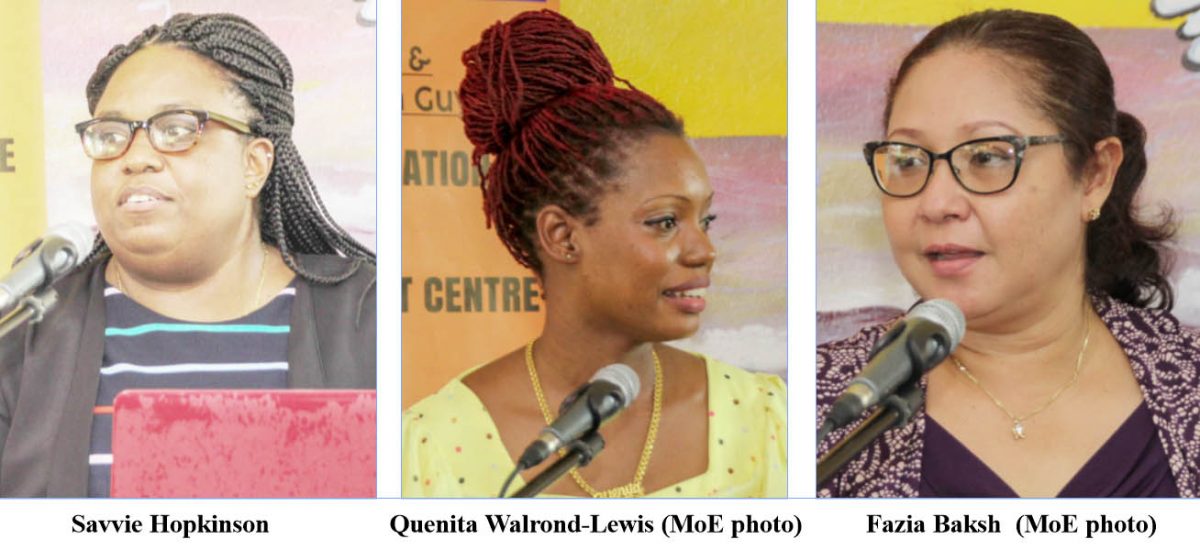Special Education Needs (SEN) Officers of the Ministry of Education (MoE) have been challenged to update their methods especially in response to the changes that have resulted due to COVID-19.
According to a MoE release, this statement was made by SEN Officer Savvie Hopkinson, at a conference that was held on Friday at the Regional Diagnostic Centre in Turkeyen and attended by SEN officers and technical staff of the Centre. They were using this occasion to reaffirm “their commitment to improving the quality of life of persons with special education needs within the school system and by extension Guyana.”
Hopkinson told the gathering that from the onset of the COVID-19 pandemic, SEN officers have found it necessary to “revisit the way they function and engage in their various capacities within the Ministry.” She also observed that the SEN sector of the MoE could not continue to “utilise yesterday’s strategies to undertake today’s tasks and expect to effectively meet tomorrow’s challenges.” The changes that were taking place in the environment and the institutions was cause, she added, for them to “revisit their work, review strategies and counter the new environmental factors.”
For 2021, some of the activities and area that will be focussed on will be: virtual training, SEN awareness campaigns, blind and deaf education, adopting acceptable measures during COVID, coping with home-schooling, mental health and stress management, sign language, and parent education.
Parent education was singled out for its importance last year since the arrival of the pandemic saw parents assuming the role of classroom teachers. Hopkinson posited that efforts must be accelerated in this area using strategies such as virtual forums, home visits (while observing public health guidelines) and the Guyana Learning Channel.
And on the subject of the SEN sector adapting to change and moving forward, she remarked, “We are set upon finding ways of maintaining and eventually accelerating the development of students through the departure from old forms and pedagogy to boldly embracing those principles and practices that yield expected results for personal fulfilment and national goals.” Hopkinson remarked.
The Director of the National Centre for Education Resource Develop-ment (NCERD), Quenita Walrond-Lewis, told the officers that their vocation is a “blessed” one. “Not everyone can answer this particular call. Your hearts are big, your minds are focused and aware and you have a consciousness that taps into everything that is good and right in humanity when you can see our most vulnerable as deserving, see our most challenged as capable and able and commit your life and work to levelling playing fields, breaking down barriers and building bridges every day.”
She emphasised that advocacy is important to the work done by the Officers because issues of access, equity and quality “fall on deaf ears if no one is pushing for change,” and that collectively their voices must become a ‘thunderous roar’ for those who are silenced or disenfranchised.
Walrond-Lewis assured the gathering that NCERD will support the Officers’ journey through advocacy, access, equity and quality “as they continue to make a positive impact in the education sector and the country at large.”
Deputy Chief Education Officer (Administration) (Ag), Fazia Baksh in her remarks said that educating a child is not just about writing examinations but moulding the child and equipping him or her with the skills that will enable them to lead very successful lives.
She mentioned the right of all students, regardless of background, ability, or disability, to have access to education. “The inclusion of students with special education needs and disability is a process of meshing general and special education reform initiatives and strategies to achieve a unified system of public education. All children and youth should be active and participating members of the school community that provides quality education through effective teaching and support.”
Baksh encouraged the SEN Officers to continue to use existing resources and tools in new ways to develop systems and practices that will provide benefits in the future. She said that the Ministry of Education will continue to support their efforts and provide the resources needed to sustain this period of online interactions.
Coordinator of the Regional Special Education Needs/Disability Diagnostic and Treatment Centre, Keon Cheong, told the officers that Guyana has come a far way over the past few years as a result of their work which cannot be ignored.
During the session, the Regional Officers from Districts Three, Four, Five, Six, Ten, and Georgetown discussed the work done in their districts and their plans for 2021, the release added.










